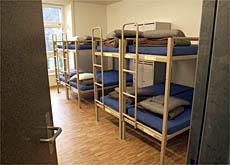
House of Representatives throws out asylum cuts

Plans to cut spending on asylum by SFr137 million ($104 million) have been rejected by the House of Representatives.
An alliance of Left and Right called for a review of the effect the cuts would have on Switzerland’s asylum system.
The cuts are part of government proposals to save SFr3.3 billion in spending over the next three years.
The proposals will now go back to the Senate for further discussion.
They go hand-in-hand with a change to the system, whereby asylum seekers who have had their applications turned down would no longer be entitled to government-funded support, and the deadline for appeals will be shortened.
“The new measures mean that around 8,000 people would be thrown on to the streets next year here in Switzerland,” Jürg Schertenleib of the Swiss Refugee Council told swissinfo.
“The cantons and non-governmental organisations such as ourselves are very sceptical as to whether any real savings will be made under the planned cuts – instead they will be passed on to the cantons.”
Astronomical cost
Schertenleib says cantons will be forced to “pick up the tab” for asylum seekers and the actual cost to the country and the taxpayer could be astronomical.
“The Swiss constitution clearly states that any person living in Switzerland has the right to shelter, food, clothing and even medical care,” he said.
“Who is going to pay for this if the federal state is no longer responsible? It’s very clear it’ll be the cantons and the local communities.”
Schertenleib’s argument has also won the support of the Swiss People’s Party – usually the most ardent supporter of tougher rules for asylum seekers.
Rita Fuhrer, a member of the People’s Party and head of canton Zurich’s social services says the government is shirking its responsibility when it comes to the funding of asylum seekers.
“The government wants all immigrants whose cases aren’t being considered to be classified as illegal immigrants, just so it can shed its own responsibility and make the cantons responsible,” she told swissinfo.
Monitoring
Dominique Boillat of the Federal Refugee Office denies that either the cuts or reforms will throw Switzerland’s asylum system into chaos.
But he admits there is a slight risk that cantons will have to find more money from their own budgets to meet the costs of asylum seekers.
“The catastrophic image is absolutely exaggerated,” he told swissinfo. “There will be some cases of asylum seekers ending up on the streets but not in numbers running into the thousands.”
“We will also have a monitoring system in place that will show us if there is an increase in crime or homelessness among asylum seekers. We don’t think that will be the case.”
Schertenleib though remains convinced that large numbers of asylum seekers will find themselves homeless and worries about the damage that will do to their image among the population at large.
“If rejected asylum seekers are seen sleeping in stations or parks because they have no shelter, the Swiss will just get the impression that the asylum field is out of control and we need to do something,” he said.
“This is a potential danger and it may be exploited by those who want to introduce even tougher restrictions.”
European problem
Schertenleib also criticises the timing of the cuts, just as Switzerland is negotiating a bilateral agreement with the European Union on migration.
Schertenleib maintains that many asylum seekers will simply go to Switzerland’s neighbouring countries to submit their applications
“This is a very crucial moment and the new system really goes against the principal of trying to reach a coordinated European solution to the problem – the Dublin treaty,” he said.
Boillat agrees that Europe needs a common policy on asylum, but denies that the cuts will harm Switzerland’s chances of reaching an agreement with the EU.
“We are absolutely aware that over the next couple of years we have to find a European solution,” he said.
“Switzerland has to reach an agreement with the EU because this is not a problem we can solve by ourselves.”
swissinfo, Jonathan Summerton
Proposed spending cuts: 2004 – SFr1 billion; 2005 – SFr2.2 billion; 2006 – SFr3.3 billion.
The environment, transport, energy and communications ministry is set to be the biggest loser with planned cuts of SFr666 million
The government is looking to cut spending on asylum by SFr 137 million over the next three years.
Switzerland’s national debt currently stands at SFr127 billion.

In compliance with the JTI standards
More: SWI swissinfo.ch certified by the Journalism Trust Initiative




























You can find an overview of ongoing debates with our journalists here . Please join us!
If you want to start a conversation about a topic raised in this article or want to report factual errors, email us at english@swissinfo.ch.